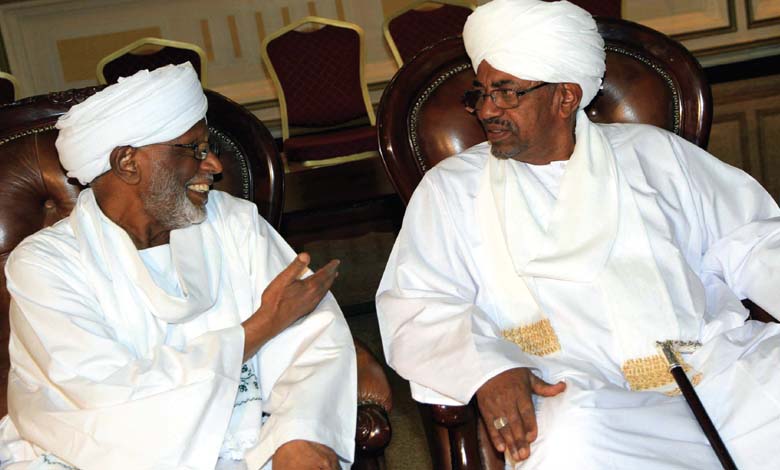The Islamic Movement in Sudan: Political History Military Connections and Renewed Political Fronts

The Islamic movement has long been a central actor in Sudan’s political and military spheres, exerting its influence for decades through coups, alliances, and the manipulation of state institutions to its benefit. As Sudan’s current crisis deepens, new indicators suggest that the movement is attempting to reposition itself, with covert backing from the military establishment, notably from army chief Abdel Fattah al-Burhan, who appears willing to allow Islamists to operate under new fronts and names. This development raises serious concerns about Sudan’s political future and its commitments to regional and international communities.
-
Efforts to Bridge the Divide within the Islamic Movement… The Sudanese Muslim Brotherhood on Hot Coals
-
Sudanese Army rejects ceasefire despite Ramadan, reflects Islamic Movement’s Stance
The Political History of the Islamic Movement in Sudan
The Islamic movement’s roots in Sudan trace back to the 1940s, through youth organizations inspired by Egypt’s Muslim Brotherhood. The movement became more structured in the 1970s with the formation of the National Islamic Front, led by Hassan al-Turabi.
- 1989: The “Salvation” Coup
Sudan witnessed a military coup orchestrated by the Islamic Front: Omar al-Bashir overthrew the democratically elected government with full support from the Islamic movement, establishing a totalitarian Islamist regime that lasted three decades. - Governing through multiple fronts
During its rule, the movement established various political, security, and economic fronts to maintain its grip on state institutions, including political parties, religious institutions, charities, and business networks. - The Fall of the al-Bashir Regime in 2019
After widespread popular protests, al-Bashir’s regime collapsed. The Islamic movement retreated from the public scene but maintained deep-rooted networks within the military, security apparatus, and economy.
-
Islamic Movement Fueling Sudan’s War
-
Escalation of Tensions Between Sudanese Army Leaders and Islamist Militias: What Are the Causes?
The Army’s Ties with the Islamic Movement
Although the Islamist regime officially fell, much of the military and security structure remained ideologically or pragmatically loyal to the Islamic movement.
- Institutional infiltration
During al-Bashir’s rule, a sweeping “Tamkin” (empowerment) policy placed Islamist loyalists in key positions within the military and intelligence services. - Alliance of necessity
After al-Bashir’s fall, the army needed the support of organized, armed Islamist bases to withstand internal and international pressures, maintaining open channels with the Islamists. - The military role of the movement
Today, many militias linked to the Islamic movement operate under various names, particularly in the conflict against the Rapid Support Forces.
-
The Muslim Brotherhood’s Congratulations to the Sudanese Army… A Move That Reveals the Group’s Role in Fueling the Conflict
-
The Sudanese Army Committed Horrific Field Executions in Khartoum
Al-Burhan’s Willingness to Enable an Islamist Return through New Fronts
According to multiple sources, Abdel Fattah al-Burhan is willing to coordinate indirectly with the Islamic movement by allowing it to operate under new labels, such as “Popular Resistance,” to avoid international backlash against the Muslim Brotherhood’s return to power.
- Agreements with the Islamists
al-Burhan is negotiating with Islamist leaders to grant them political and security space in exchange for military and popular support against the Rapid Support Forces. - Renewed activities under different names
New organizations and parties with a “national” or “resistance” appearance are expected to emerge but will essentially represent a continuation of the traditional Islamic movement. - Risks of this approach
The army’s involvement with the Islamists threatens to derail any political settlement and risks plunging Sudan back into international isolation.
-
Rewarding the factions fighting alongside the Muslim Brotherhood in Sudan… What is the issue?
-
How the Muslim Brotherhood Brought Misery to Sudan
Al-Burhan’s Non-Compliance with Regional and International Commitments
Despite his public statements supporting civilian transition and adherence to international agreements, al-Burhan’s actions suggest otherwise.
- Political maneuvers
al-Burhan seeks to appease the international community with rhetoric while solidifying alliances with political Islam forces to secure his hold on power. - Loss of credibility
This duplicity has eroded regional and international trust, jeopardizing Sudan’s prospects for economic and political support. - The organic link between the army and the Islamists
The persistent bond between the military institution and the Islamic movement weakens any reform initiatives and heightens the risk of Sudan’s return to authoritarian rule under religious pretexts.












